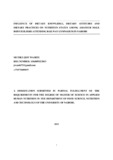| dc.description.abstract | Most amateur bodybuilders tend to have inadequate access to proper nutritional information that may result in them adopting poor dietary practices. This can lead to overnutrition and the resultant negative effects associated with overnutrition. This study was a cross-sectional study that involved identifying the dietary knowledge, dietary attitudes and dietary practices of amateur male bodybuilders. Data was collected regarding the dietary knowledge, dietary attitudes and dietary practices as well as anthropometric measurements from 162 randomly selected amateur male bodybuilders who worked out at Railway Gymnasium, Dagoretti North Constituency in Nairobi County. The anthropometric assessments included body fat percentage, the Body Mass Index (BMI) and the Waist – Height Ratio (WHtR). The data collected was analysed using descriptive statistics and inferential statistics. A P-value of <0.05 was considered significant in all the analyses.
The mean BMI of the respondents was 25.72 (±0.41) which is classified as overweight, the mean body fat percentage was 14.09 (±0.48) which is in the healthy range while the mean waist-height ratio (WHtR) was 0.49 (±0.004) which is classified as healthy. The nutrition knowledge of the respondents was good with 91.4% of the respondents having good knowledge. However, 56.2% of the respondents had a negative attitude towards nutrition. Knowledge score of the respondents was significantly associated with their percent body fat (P=0.013) while attitude assessment score of the respondents was also significantly associated with their percent body fat (P=0.037).
There was a significant association between the knowledge of the respondents’ and their frequency of consumption of meat products (P=0.019), fish (P=0.001) and deep fried foods (P=0.032). Attitude of the respondents was significantly associated with their frequency of consumption of nuts and peanut butter (P=0.044) and water (P=0.037). The nutrition status of the respondents was influenced unanimously among all 3 indices by the frequency of consumption of red meat; body fat (P=0.041), BMI (P=0.001) and WHtR (P=0.004).
The study concludes that dietary knowledge and dietary attitude of amateur male bodybuilders are determinants of dietary intake with regards to some foods.
Dietary attitude as well dietary knowledge are associated with nutrition status. Frequency of consumption of red meat and protein shakes are associated with the nutrition status of amateur male bodybuilders.
The information generated by this study will form the basis for developing an educational curriculum for bodybuilders in Nairobi to promote greater nutritional knowledge and healthier attitudes among bodybuilders. This is in the long run will help reduce the incidence of disease particularly chronic lifestyle diseases in the society. | en_US |

